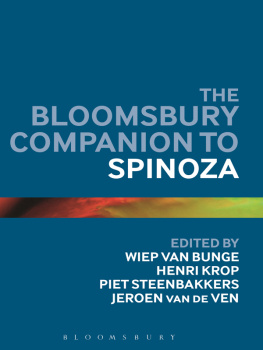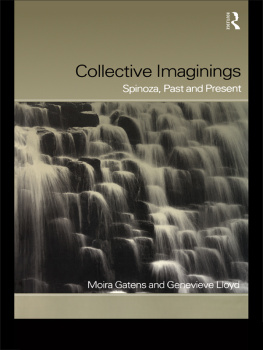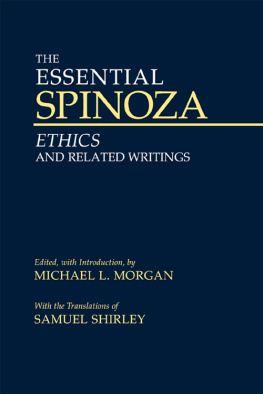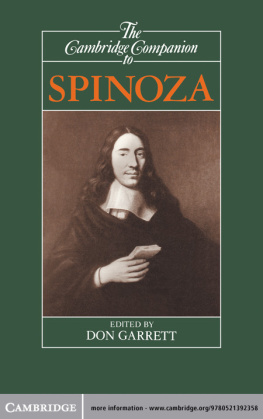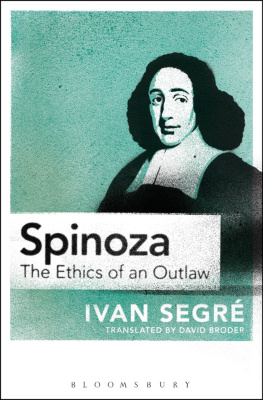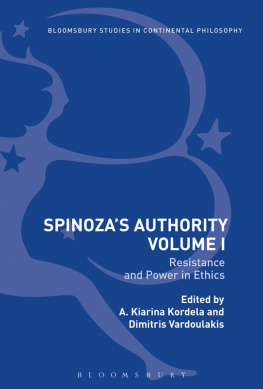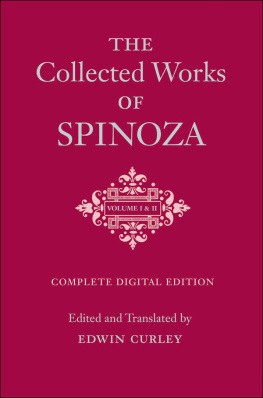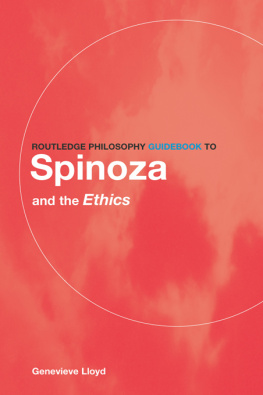Benedictus de Spinoza - Spinozas Ethics
Here you can read online Benedictus de Spinoza - Spinozas Ethics full text of the book (entire story) in english for free. Download pdf and epub, get meaning, cover and reviews about this ebook. year: 2020, publisher: Princeton University Press, genre: Religion. Description of the work, (preface) as well as reviews are available. Best literature library LitArk.com created for fans of good reading and offers a wide selection of genres:
Romance novel
Science fiction
Adventure
Detective
Science
History
Home and family
Prose
Art
Politics
Computer
Non-fiction
Religion
Business
Children
Humor
Choose a favorite category and find really read worthwhile books. Enjoy immersion in the world of imagination, feel the emotions of the characters or learn something new for yourself, make an fascinating discovery.
- Book:Spinozas Ethics
- Author:
- Publisher:Princeton University Press
- Genre:
- Year:2020
- Rating:3 / 5
- Favourites:Add to favourites
- Your mark:
- 60
- 1
- 2
- 3
- 4
- 5
Spinozas Ethics: summary, description and annotation
We offer to read an annotation, description, summary or preface (depends on what the author of the book "Spinozas Ethics" wrote himself). If you haven't found the necessary information about the book — write in the comments, we will try to find it.
Spinozas Ethics — read online for free the complete book (whole text) full work
Below is the text of the book, divided by pages. System saving the place of the last page read, allows you to conveniently read the book "Spinozas Ethics" online for free, without having to search again every time where you left off. Put a bookmark, and you can go to the page where you finished reading at any time.
Font size:
Interval:
Bookmark:
Spinozas Ethics
Spinozas Ethics
Translated by George Eliot
Edited by Clare Carlisle
Assistant Editors
Zachary Gartenberg and Davide Monaco
PRINCETON UNIVERSITY PRESS
PRINCETON AND OXFORD
Copyright 2020 by Princeton University Press
Published by Princeton University Press
41 William Street, Princeton, New Jersey 08540
6 Oxford Street, Woodstock, Oxfordshire OX20 1TR
press.princeton.edu
All Rights Reserved
ISBN 978-0-691-19323-6
ISBN (pbk.) 978-0-691-19324-3
ISBN (e-book) 978-0-691-19704-3
Version 1.0
British Library Cataloging-in-Publication Data is available
Editorial: Ben Tate and Charlie Allen
Production Editorial: Jenny Wolkowicki
Text design: Lorraine Doneker
Production: Jacqueline Poirier
For my mother, Susan, who taught me to read
- xi
Dans une tnbreuse et profonde unit,
Vaste comme la nuit et comme la clart
Charles Baudelaire, Correspondances (1857)
I am indebted to my assistant editors, Zach Gartenberg and Davide Monaco, who made a huge contribution to this project during the final three months of preparing the text. Their expertise and conscientiousness have made this edition immeasurably richer and more rigorous than it would have been without their help, and their enthusiasm for both Spinoza and George Eliot has been a delight. Many of the endnotes are the result of their work comparing George Eliots text with different Latin editions and English translations. Davide came up with the excellent idea of a Table of Emotions (see Appendix 2), and Zach helped him compile it.
This book would not have been possible without Jonathan Ouvrys kind permission to publish George Eliots translation of the Ethics. John Burton of the George Eliot Fellowship has been very helpful in various practical matters, not least in providing me with the image of George Eliot used on p. 2. I am also grateful to the Beinecke Library for permission to include images of George Eliots manuscript in the book.
I would like to thank those friends and colleagues who read my introduction to the text and provided invaluable advice and encouraging comments: Mogens Laerke, Rosemary Ashton, Chris Insole, Ruth Abbott, and John Tresch. Thanks too to all in the London Spinoza Circleand especially Susan James and John Heydermanfor the decidedly Spinozist joys of shared scholarly insight and philosophical friendship that flourish in our gatherings.
Kings College London has made it possible for me to research and write this book; I continue to feel amazed at the existence of this wonderful university, which allows me to think, read, teach, and write for a living. The University of Londons Senate House Library has, as usual, been an invaluable resource. The British Society for the History of Philosophy helped fund my visit to the Beinecke Rare Book and Manuscript Library at Yale University, where I spent many happy hours in the company of George Eliots manuscript of the Ethics. The librarians at the Beinecke were gracious and helpful, and Michael Della Rocca made me feel very welcome at Yale.
At Princeton University Press, Jenny Wolkowicki oversaw production and Jennifer Backer copyedited the text meticulously. Ben Tate has been a marvelous editor, and I am so grateful for his support and enthusiasm for this book, from proposal to publication.
An Introduction
Our philosophical landscape is populated by growing numbers of Spinozists, and by quite a few Spinozas. Some uncontested facts provide common ground: he was born Baruch Spinoza in 1632, the son of Jewish Portuguese immigrants, and he was raised in Amsterdams Jewish community, from which he was expelled in 1656, never to return; from then on he took the name Benedict (the Latin version of Baruch, meaning blessed), associated with Christians of various kinds, but refused to join any Church. From here, characterizations of Spinoza diversify. There is the brave critic of superstitious religion, a clear-eyed prophet of the secular age: this Spinoza heralded a radical Enlightenment more than a century before Kant. There is the daring anti-theological thinker of pure immanence, popularized in recent years by Gilles Deleuzes influential interpretation of Spinozas philosophy. There is a Spinoza whose invocation of God or Nature represents a more familiar naturalism: his readers equate God to a modern, materialist conception of nature and tend to dismiss as rhetoricalor as mere nonsensethose passages in his works that suggest a more religious view. There are also left-wing and liberal Spinozas, early champions of equality, individual freedom, and democracy. Hovering among these modern Spinozas is the ghost of Spinoza the atheist, which haunted generations of readers and critics during the seventeenth and eighteenth centuries. While this old Spinoza was castigated for his monstrous atheism, his descendants are now celebrated for it.

Marian Evans in Berlin, 1854; photograph provided by The George Eliot Fellowship.

Benedict de Spinoza; lithograph by Karl Bauer, originally published in Spinoza im Portrt by Ernst Altkirch (Jena: Eugen Diederich, 1913).
The present text is, as far as we know, the first English translation of the Ethics. It was completed in 1856 by Marian Evans, then a successful woman of letters, who in the following year began to publish stories under the pseudonym George Eliot. She encountered a different Spinoza, more angel than monster: he wore a bright new halo, conferred by the admiration of successive German geniuses, including the poets Goethe and Novalis, the theologian Schleiermacher, and the philosophers Schelling and Hegel. Like Spinoza himself, these thinkers were neither atheists nor conventionally religious. Though they did not grasp Spinozas philosophy perfectly, they appreciated its spiritual depth at a time when Protestant orthodoxy was being challenged in unprecedented ways, in Germany as in England. Through the first decades of the nineteenth century, this Spinozism emanated from the German university towns, its strange glow illuminating the avant garde of English intellectual life.
The Ethics is indeed a radiant book, though a tough one. It is Spinozas greatest work, sitting easily among the true masterpieces of Western philosophy, and perhaps rivaled only by Platos Republic in its completeness and power as a work of both ethics and metaphysics. It was written in Latin, like most of Spinozas works, and published shortly after his death in 1677. It crowned a brilliant philosophical career, which included a critical exposition of Descartess philosophy (1663), the controversial Theologico-Political Treatise (1670), various unpublished writings, including a book on Hebrew grammar, and a large correspondence in which Spinoza elaborated his philosophical system as well as his views on religious and scientific questions.
Part I of the Ethics sets out Spinozas theologyhis account of God, and of Gods relationship to everything elseand at the core of this theology is the claim that Whatever is, is in God (E1, P15). This expresses in propositional form St. Pauls insistence that God is not far from each one of us, for in him we live and move and have our beingan insight Paul offered in Athens, a city full of idols, as a corrective to the pagan idea that the deity is an image formed by the art and imagination of mortals. In the seventeenth century, Spinoza was responding to a similar error: he saw that the mainstream Christian churches were propagating an idolatrous image of God formed after the pattern of human power, as if God were a great king or an omnipotent father, eager to reward or punish people for their obedience or disobedience. Spinozas claim that all things are
Font size:
Interval:
Bookmark:
Similar books «Spinozas Ethics»
Look at similar books to Spinozas Ethics. We have selected literature similar in name and meaning in the hope of providing readers with more options to find new, interesting, not yet read works.
Discussion, reviews of the book Spinozas Ethics and just readers' own opinions. Leave your comments, write what you think about the work, its meaning or the main characters. Specify what exactly you liked and what you didn't like, and why you think so.


